Managing personal finances can feel overwhelming, especially in a world full of options and financial products. Luckily, Wheon.com is here to simplify the process with curated insights and actionable advice. Whether you’re just starting your financial journey or looking for new strategies, mastering the basics can set you on the path toward achieving your goals.
This guide will walk you through five essential finance tips, from budgeting to building emergency funds, all curated to help you make the most of your money. Let’s get started!
Tip 1: Understand the Basics of Budgeting
Budgeting is the foundation of financial success. It helps you track your income, control your expenses, and allocate funds toward your goals. A simple approach to budgeting is the 50/30/20 rule:
- 50% for essentials like rent, utilities, groceries, and transportation.
- 30% for discretionary spending like dining out, hobbies, or entertainment.
- 20% for savings and debt repayment.
By creating a monthly budget using tools like spreadsheets or apps, you can prevent overspending and start saving for the future.
Pro Tip: Review your income and expenses every month to adjust your budget based on changing needs. Start small and stick with it; consistency is key.
Tip 2: Master Saving Strategies for Long-Term Goals
Saving goes beyond setting aside money randomly; it’s about having a plan. First, identify your financial goals. Are you saving for a house, retirement, a dream vacation, or your child’s education? Clear goals will fuel your motivation and help you determine a timeline.
Three effective saving strategies include:
- Open a High-Yield Savings Account for better returns than traditional savings accounts.
- Automate Your Savings to ensure a portion of your income goes directly to savings, avoiding temptation.
- Consider “Paying Yourself First” by depositing savings before looking at discretionary spending.
Tip Highlight: Use Wheon.com for helpful calculators and insights to stay on top of your savings game.
Tip 3: Investing Wisely – A Beginner’s Guide
When it comes to wealth building, investing is every bit as important as saving. However, it can seem daunting for beginners. Start by following these steps:
- Learn the basics of investments, such as stocks, bonds, and mutual funds.
- Begin with low-cost index funds or ETFs (exchange-traded funds) for diversified and beginner-friendly investments.
- Understand your risk tolerance. Higher risk can yield higher rewards but isn’t always best depending on your stage of life and goals.
Long-term investing allows your money to grow through compound interest, so the earlier you start, the larger the gains you’ll see over time. Be sure to consistently educate yourself with resources, like those offered on Wheon.com’s finance section.
Quick Win: Investing apps like Acorns or Robinhood allow you to start small while building confidence.
Tip 4: Develop Strong Debt Management Techniques
Debt can be a significant roadblock to financial success, but it doesn’t have to be. Knowing the right strategies can help you pay off debt and improve your financial health.
Here’s how to tackle debt effectively:
- Use the Debt Avalanche Method to pay down debts with the highest interest rates first, saving the most money over time.
- Alternatively, try the Debt Snowball Method, which prioritizes smaller debts first for quick wins to build momentum.
- Consider refinancing high-interest loans or transferring balances to lower-interest credit cards to save on interest payments.
Reducing debt not only improves your credit score but also gives you more financial flexibility to achieve other goals.
Pro Tip: Avoid taking on new debt by assessing whether purchases are wants or needs and building better spending habits.
Tip 5: Build and Maintain an Emergency Fund
Life is unpredictable, and an emergency fund can serve as your financial safety net during tough times. Aim to save enough to cover three to six months’ worth of living expenses.
Here’s how to get started:
- Set a realistic initial goal, like $1,000, to create a starting cushion.
- Treat it like a non-negotiable expense and contribute to it regularly.
- Keep it in an easily accessible account but separate from your daily spending account to reduce temptation.
An emergency fund ensures that unexpected expenses like medical bills, car repairs, or job loss won’t derail your financial stability.
Pro Insight: Use Wheon.com’s tools to calculate how much you’ll need for your emergency fund and track your progress.
Why Financial Literacy Matters Now More Than Ever
Improving your financial literacy is a lifelong process with immeasurable benefits. It empowers you to make smarter decisions, avoid unnecessary pitfalls, and build the future you want.
If you’re ready to start taking control of your finances, Wheon.com is here to help. From tools and resources to expert advice, Wheon.com finance tips cover everything you need to grow your financial know-how.
Looking for more personalized insights? Explore Wheon.com and begin your financial success story today.

